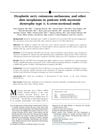 57 citations,
June 2018 in “Nutrients”
57 citations,
June 2018 in “Nutrients” Celiac disease can cause skin problems that may get better with a gluten-free diet.
 49 citations,
April 2000 in “Journal of The American Academy of Dermatology”
49 citations,
April 2000 in “Journal of The American Academy of Dermatology” Despite progress in treatment, the exact cause of Alopecia areata is still unknown.
 45 citations,
January 1992 in “Dermatology”
45 citations,
January 1992 in “Dermatology” Half of the patients treated with a specific drug for skin cancer experienced hair loss not related to the drug's dosage.
 41 citations,
August 1988 in “Journal of The American Academy of Dermatology”
41 citations,
August 1988 in “Journal of The American Academy of Dermatology” A woman with subacute cutaneous lupus erythematosus had widespread skin symptoms triggered by medication and sunlight, which improved with specific treatments.
 39 citations,
April 2016 in “Case Reports in Dermatology”
39 citations,
April 2016 in “Case Reports in Dermatology” Tofacitinib temporarily regrew hair in a man with alopecia, but its effects didn't last.
 37 citations,
June 2018 in “Clinical and Experimental Medicine”
37 citations,
June 2018 in “Clinical and Experimental Medicine” People with alopecia areata often have lower vitamin D levels and more inflammation, suggesting vitamin D might be involved in the condition.
 30 citations,
June 2012 in “Current Opinion in Endocrinology, Diabetes and Obesity”
30 citations,
June 2012 in “Current Opinion in Endocrinology, Diabetes and Obesity” Nonclassic congenital adrenal hyperplasia is a genetic disorder causing hormone imbalances, affecting fertility and requiring personalized treatment.
 23 citations,
January 2015 in “Journal of The American Academy of Dermatology”
23 citations,
January 2015 in “Journal of The American Academy of Dermatology” People with myotonic dystrophy type 1 have a higher chance of getting skin tumors, including melanoma.
 22 citations,
April 1998 in “Dermatologic Clinics”
22 citations,
April 1998 in “Dermatologic Clinics” Interferons are effective for some skin conditions and cancers, but can have side effects and need more research for optimal use.
 21 citations,
June 2019 in “Dermatologic Surgery”
21 citations,
June 2019 in “Dermatologic Surgery” Platelet-rich plasma (PRP) treatment has been found effective in promoting hair growth for alopecia patients, with minimal side effects like temporary pain and redness.
 21 citations,
September 1990 in “Journal of The American Academy of Dermatology”
21 citations,
September 1990 in “Journal of The American Academy of Dermatology” Taking L-tryptophan supplements might cause a condition similar to scleroderma in some people, which can get better after stopping the supplement and starting corticosteroid therapy.
 20 citations,
February 2017 in “International Journal of Dermatology”
20 citations,
February 2017 in “International Journal of Dermatology” Platelet-based therapies using a patient's own blood show promise for skin and hair regeneration but require more research for confirmation.
 20 citations,
June 2010 in “Genes and Immunity”
20 citations,
June 2010 in “Genes and Immunity” Blood tests can help understand the genetic differences in people with alopecia areata, including how severe it is and if it's inherited.
 20 citations,
November 2005 in “Journal of Investigative Dermatology Symposium Proceedings”
20 citations,
November 2005 in “Journal of Investigative Dermatology Symposium Proceedings” IFN-γ and IL-2 are important for T cell activation in hair loss in mice.
 19 citations,
December 2001 in “Dermatologic Therapy”
19 citations,
December 2001 in “Dermatologic Therapy” Horizontal scalp biopsy sections are better for diagnosing alopecia areata, showing fewer hair follicles and more miniaturized hairs.
 19 citations,
March 1997 in “Journal of Cutaneous Pathology”
19 citations,
March 1997 in “Journal of Cutaneous Pathology” Alopecia areata involves specific T-cells, unlike androgenetic alopecia.
 17 citations,
January 2010 in “Acta Dermato Venereologica”
17 citations,
January 2010 in “Acta Dermato Venereologica” EGFR inhibitors can cause yellowish skin eruptions.
 14 citations,
February 2023 in “Frontiers in immunology”
14 citations,
February 2023 in “Frontiers in immunology” Immune checkpoint inhibitors can cause skin issues but are linked to better cancer outcomes.
 13 citations,
July 1996 in “Annals of Internal Medicine”
13 citations,
July 1996 in “Annals of Internal Medicine” International medical graduates outperformed U.S. graduates on an internal medicine exam.
 13 citations,
July 1996 in “Annals of Internal Medicine”
13 citations,
July 1996 in “Annals of Internal Medicine” International medical graduates outperformed U.S. graduates on an internal medicine exam.
 12 citations,
May 2017 in “Pharmacology & therapeutics”
12 citations,
May 2017 in “Pharmacology & therapeutics” Targeting immune tolerance issues in Alopecia Areata could restore hair growth and maintain remission.
 11 citations,
May 2009 in “Actas Dermo-Sifiliográficas”
11 citations,
May 2009 in “Actas Dermo-Sifiliográficas” Some treatments can help hair regrowth in alopecia areata, but none offer a cure, and effectiveness varies.
 5 citations,
February 2015 in “Endocrinology Diabetes and Metabolism Case Reports”
5 citations,
February 2015 in “Endocrinology Diabetes and Metabolism Case Reports” Insulin therapy helped a man with autoimmune issues regrow his hair.
 4 citations,
July 1996 in “Annals of Internal Medicine”
4 citations,
July 1996 in “Annals of Internal Medicine” High doses of fluconazole can cause reversible hair loss.
 3 citations,
April 2019 in “Journal of Dermatological Treatment”
3 citations,
April 2019 in “Journal of Dermatological Treatment” Caffeine shows promise for treating some types of hair loss, but more research is needed.
 3 citations,
July 2017 in “Elsevier eBooks”
3 citations,
July 2017 in “Elsevier eBooks” Skin reactions are a common reason for emergency visits due to drug allergies, with some severe cases needing intensive care.
 3 citations,
April 2012 in “Fertility and Sterility”
3 citations,
April 2012 in “Fertility and Sterility” Finasteride may cause infertility in rats by affecting epididymis and sperm function.
 2 citations,
January 2021 in “JAAD Case Reports”
2 citations,
January 2021 in “JAAD Case Reports” Using a special laser and skin medication together successfully cleared a skin condition in a pregnant woman.
 2 citations,
December 2018 in “International journal of current microbiology and applied sciences”
2 citations,
December 2018 in “International journal of current microbiology and applied sciences” The dog recovered from hypothyroidism and regrew its hair after two months of treatment.
 2 citations,
January 2014 in “Medical Principles and Practice”
2 citations,
January 2014 in “Medical Principles and Practice” The study suggests that people with rosacea are more likely to have chronic rhinosinusitis.






























